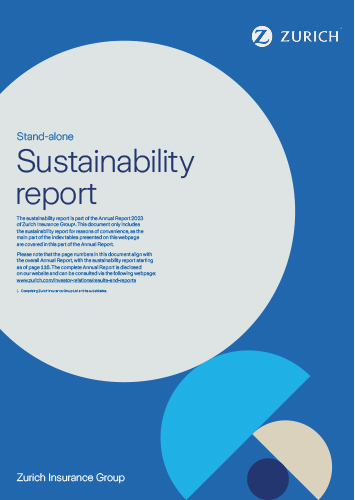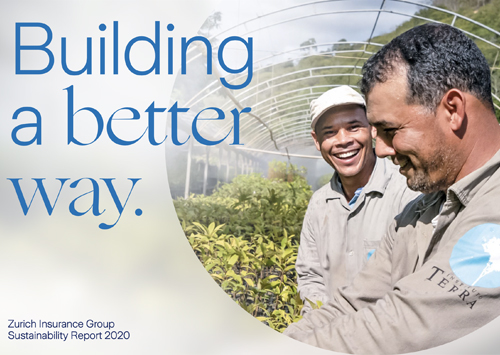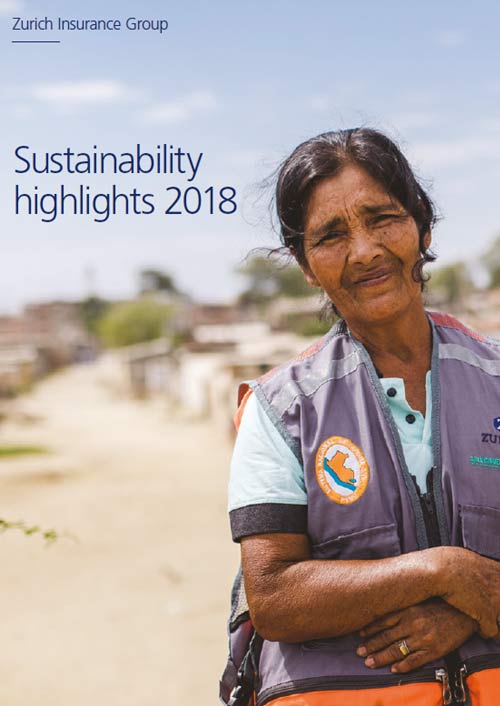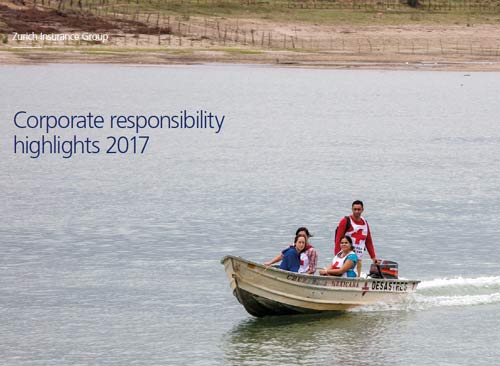
Respecting human rights
Zurich strives to ensure respect for human rights, at all levels of the business.
Our commitment to respect human rights is part of our Group’s code of conduct.
We respect the protection of international human rights within our sphere of influence and will work hard to avoid being complicit in human rights abuses.
The Zurich Insurance Group (Zurich) is committed to fair and responsible business and prohibits all forms of bribery and corruption, as well as any business conduct that could create the appearance of improper influence.
When interacting with customers, employees, shareholders, suppliers, the public at large or any other stakeholder, we aim to promote the following international best-practice standards to manage potential adverse human rights impacts:
- Guiding Principles on Business and Human Rights: Implementing the United Nations ‘Protect, Respect and Remedy’ Framework
- OECD Guidelines for Multinational Enterprises
- United Nations Global Compact
By signing the UN Global Compact in 2011, we committed to aligning our strategy, culture and day-to-day operations with the Global Compact’s 10 universally accepted principles in the areas of human rights, labor, environment and anti-corruption.
We pay special attention to transactions that might contravene human rights and forced labor. These are six of the 10 UN Global Compact principles which relate to human rights.
Applicability of our code of conduct
Our code applies to everyone at Zurich and its subsidiaries worldwide, including board members and employees including management. Regardless of our role, responsibilities or where we are located in the world, we each do our part to consider the code and related policies as we go about our daily activities and decisions. We endeavor to work with third parties such as consultants, advisers, suppliers and agents who share our values, and we expect our business partners to adhere to the spirit of our code and embrace high standards of business conduct.
Our responsibility as insurer
Zurich supports many sectors of the economy through its insurance and investment activities. As part of our work with customers to help them manage sustainability risks, Zurich uses a three-step approach that systematically detects, assesses, and mitigates major environmental, social and ethical risks that are inherent in specific business transactions. We pay special attention to transactions that might contravene human rights and forced labor prohibitions. These are transactions that could:
- Contribute to human rights abuses such as relocation of local communities without due process, inappropriate use of force or adverse impacts on vulnerable indigenous people.
- Support regimes, governments, government officials or other politically exposed persons in countries with poor governance (for example failed states, conflict or war zones, and ineffective rule of law) or poor human rights records.
- Enable harmful child labor, forced labor, poor health and safety conditions and unfair remuneration.
Our responsibility as investor
Proactively integrating environmental, social and governance (ESG) factors, including human rights, in our investing will help Zurich to do its job well on a long-term basis.
Through impact investing, Zurich can help fund solutions to some of the pressing social or environmental issues of our time. We have a direct interest in sustainable global economic growth and supporting communities in becoming more resilient to environmental and social challenges. Impact investments can help address these issues through targeted, positive impact and also offer a financial return commensurate with risks.
Our responsibility as employer
Fairness and inclusion
Zurich does not tolerate harassment, discrimination or bullying in the workplace, whether based on race, ethnicity, color, age, sex, gender, gender identity or expression, sexual orientation, national origin, religion, disability, pregnancy, veteran status, or any other relevant characteristic protected under applicable law. This applies regardless of an individual’s duties or position within the company.
These principles apply to all aspects of the employment relationship, such as recruiting, assignments, training, promotion, compensation, discipline and termination.
Zurich strives to maintain an environment free from all forms of discrimination and harassment. Employees are encouraged to contact a manager or Human Resources regarding any instances of harassment, discrimination or bullying. People may also use the Zurich Ethics Line to raise any such concerns. Zurich does not tolerate retaliation against any employee who reports a concern in good faith.
Zurich recognizes the right of its employees to freedom of association, collective bargaining and to freely form and join groups for the promotion and protection of employment interests.
Health and safety
Zurich employees generally work in low-risk environments and are not exposed to significant health and safety hazards. Nevertheless, Zurich adopts a systems-based approach to managing health and safety risks in a structured and consistent way across all its operations. Zurich has a global program in place to ensure that it continually improves its health and safety performance.
Working with suppliers
When working with suppliers, we apply our third-party governance framework (TPGF), which establishes a framework of Group minimum standards for onboarding and management of third parties we work with. The TPGF adopts a risk-based approach to human rights due diligence and is underpinned by an annual risk assessment. The first step is to analyze the human rights set out in the United Nations Declaration of Human Rights, and seek to identify which, if any, of these fundamental human rights could be adversely impacted in our tier-one supply chain, i.e. those suppliers with whom we have a direct buying contract. Our initial and subsequent analysis identified a limited potential for non-respect or potential adverse impacts on human rights. We also concluded that our supply chain presents overall low exposure to non-respect or potential adverse impacts on human rights and that the labor standards and workplace practices operated by our suppliers are a critical factor in the likelihood of adverse human rights impacts occurring. In 2023, we also conducted a separate assessment in the context of child labor1, which resulted in the conclusion that there is no reasonable suspicion of child labor within our supply chain.
To support our risk assessment, we maintain a database of high-risk countries and high-risk goods and services based on data and reports from reputable NGOs and our own internal expert judgement. Our assessment of high-risk goods and services categories is based upon the prevalence of human rights issues reported and an assessment of working practices at industry or sector level.
Our assessment of high-risk countries is based on:
- The reported prevalence of human rights issues.
- The degree of respect for worker rights, based upon local laws and actual practices.
- The extent of political freedom and civil liberties.
- The extent of corruption.
The aim of our human rights due diligence is to validate that the supplier has implemented measures to respect fundamental human rights. Accordingly we have a referral process in place to investigate or to resolve, as appropriate, any red flags identified during the due diligence process. We also use a software tool that uses artificial intelligence to screen news reports, social media posts and NGO reports to monitor potential ESG-related (including human rights) supply chain issues. We also published a course covering the supplier due diligence processes (including in relation to human rights) that have been implemented under the TPGF. The completion rate of the supplier due diligence training for calendar year 2023 is 100 percent.
1 Pursuant to the Swiss Ordinance on Due Diligence and Transparency in relation to Minerals and Metals from Conflict-Affected Areas and Child Labor.
Working with communities
The Z Zurich Foundation is a Swiss-based charitable foundation established by members of the Zurich Insurance Group. The Z Zurich Foundation works in collaboration with our local offices around the world to support initiatives to create a brighter future for vulnerable people, to help them adapt to climate change, improve their mental wellbeing and enable social equity.
Examples of local programs run by the Z Zurich Foundation, in collaboration with Zurich, include the following:
- In Spain, Canada and Africa, Z Zurich Foundation collaborates with Junior Achievement, one of the world's largest and most-impactful youth-serving NGOs, to give young people the tools and resources they need to start their careers.
- A regional collaboration with the Forge Foundation in Latin America is focusing on education and career opportunities for the next generation.
- Tackle Your Feelings is a program running in Ireland and Australia in collaboration with Rugby Players Ireland and the Australian Football League’s (AFL) Players’ and Coaches’ Associations, aiming at changing attitudes and breaking down the stigma around mental health issues, changing behaviors and creating a movement of ‘champions’ in communities across the countries.
- In Turkey, the “Our Teachers: Insurance of Education” program was developed in collaboration with Türk Eğitim Derneği (Turkish Education Association). It supports female teachers assigned to villages and small towns in the early years of their career by offering tailored personal and professional development plans.









